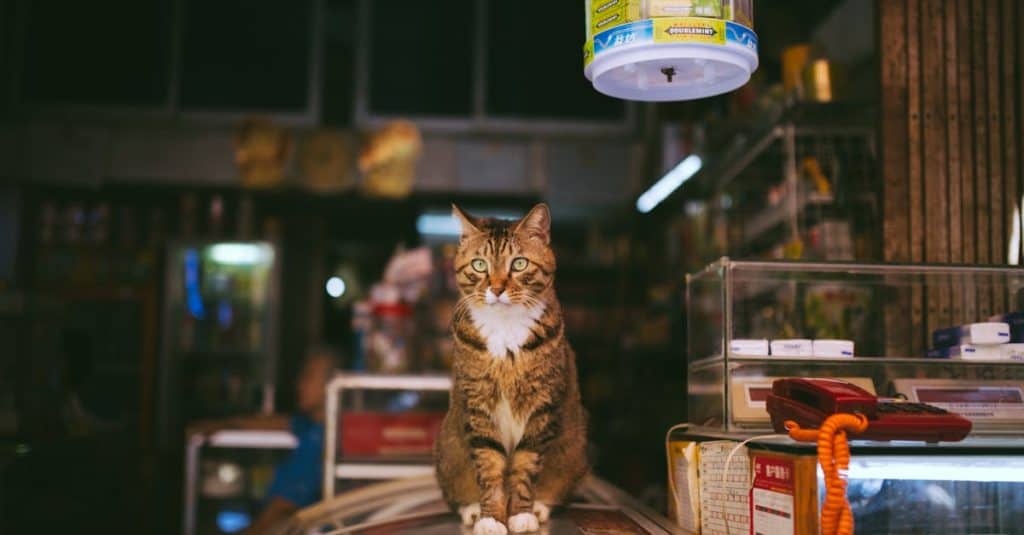Check how old is your pet in human years using our Pet Age Calculator.
Key Takeaways
- Social Nature of Budgies: Budgies are inherently social birds that thrive on interactions with their peers, making isolation or lack of socialization in pet stores detrimental to their friendliness.
- Importance of Early Socialization: Budgies that receive positive handling and varied experiences during their early weeks develop better temperaments and are more adaptable in bonding with humans.
- High-Stress Environment in Pet Stores: Factors like loud noises and overcrowding in pet stores create stress, causing budgies to display fear or aggression rather than friendliness.
- Lack of Individual Attention: Pet store budgies often do not receive enough personal handling, leading to anxious behaviors and difficulty bonding with potential owners.
- Differences with Home-Raised Budgies: Home-raised budgies, typically hand-fed and well-socialized, are more likely to form strong bonds and display affectionate behaviors compared to their pet store counterparts.
- Correcting Misconceptions: Many people mistakenly assume budgies are unfriendly due to their size, but with patience and proper socialization, these birds can become loving companions.
Walking into a pet store, I often find myself drawn to the vibrant colors and cheerful chirps of budgies. However, I can’t help but notice that many of these beautiful birds seem less than friendly.
It’s a common experience for potential budgie owners to feel a disconnect when interacting with these feathered companions.
Understanding why pet store budgies often display this aloof behavior is key for anyone considering bringing one home. Factors like their environment, socialization, and previous handling can significantly impact their temperament.
In this article, I’ll explore the reasons behind this unfriendliness and share insights on how to nurture a more affectionate bond with your future feathered friend.
Table Of Contents
- 1 Why Are Pet Store Budgies Not Friendly: Understanding Budgie Behavior
- 2 Conditions in Pet Stores
- 3 Comparison with Home-Raised Budgies
- 4 Common Myths About Budgies
- 5 Tips for Training and Socializing Budgies
- 6 Conclusion
- 7 Frequently Asked Questions
- 7.1 Why do budgies in pet stores seem unfriendly?
- 7.2 Why do budgies in pet stores seem unfriendly?
- 7.3 How important is early socialization for budgies?
- 7.4 What are the differences between pet store and home-raised budgies?
- 7.5 How can I encourage my pet store budgie to bond with me?
- 7.6 Are male budgies friendlier than females?
Why Are Pet Store Budgies Not Friendly: Understanding Budgie Behavior
Budgies possess complex behaviors influenced by their upbringing and environment. Understanding these behaviors aids in addressing the friendliness factor often seen in pet store birds.
Social Nature of Budgies
Budgies are naturally social creatures. In the wild, they form tight-knit flocks, engaging in cooperative activities daily. Their social structure necessitates interactions with fellow budgies.
Isolated circumstances in pet stores limit their ability to bond with humans, fostering anxiety. Pet store budgies often display skittishness or reactivity due to unfamiliar surroundings and lack of socialization opportunities with humans.
Importance of Early Socialization
Early socialization plays a crucial role in shaping a budgie’s temperament. Budgies exposed to positive handling and various environments during their formative weeks exhibit better adaptability.
Lack of interaction during this critical period results in fearful or aggressive behaviors. Proper socialization promotes trust, making it easier for owners to build affectionate relationships as the birds grow.
Providing engaging interactions and social experiences from a young age enhances their overall well-being and friendliness.
Conditions in Pet Stores
Pet store budgies often struggle with friendliness due to their challenging living conditions. Key factors include a high-stress environment and a lack of individual attention, which can lead to negative behavioral outcomes.
High-Stress Environment
Budgies in pet stores face multiple stressors that adversely affect their well-being. Common stressors include loud noises, constant lighting, overcrowded cages, and the presence of unfamiliar faces.
These factors can cause anxiety, leading to behaviors such as biting, fear, and reluctance to interact. Overcrowding, in particular, exacerbates aggression and discomfort among birds, escalating their stress levels further.
Research indicates that these stressors dramatically impact mental health, making it difficult for pet store budgies to display friendly behaviors typical of their species.
Lack of Individual Attention
In pet stores, budgies rarely receive personalized handling or socialization. This absence of care results in hand-shy, nervous birds that lack the necessary habituation to interact confidently with humans.
Studies show that birds raised with patience and positive reinforcement develop more friendliness and adaptability. Conversely, lack of interaction leads to fear-based responses and decreases the likelihood of forming bonds with potential owners.
The absence of individual attention in these settings can severely limit a budgie’s capacity to thrive in a home environment.
Comparison with Home-Raised Budgies
Home-raised budgies differ significantly from pet store budgies in their behavior and sociability. Understanding these differences can help prospective budgie owners make an informed choice.
Bonding and Trust
Home-raised budgies that are hand-fed and socialized from hatching develop strong bonds of trust with humans. They often display behaviors like enthusiastic perching and following their owners around.
This early human interaction cultivates affection and encourages these birds to actively seek contact with people.
Pet store budgies, however, typically experience minimal early socialization with humans. They often struggle to form these bonds, remaining fearful and distrustful.
Even with regular handling, pet store budgies exhibit slower or minimal bonding, which can lead to feelings of anxiety and reluctance to engage with potential owners.
Behavioral Differences
Home-raised budgies display affectionate and outgoing behaviors due to early and consistent exposure to human environments. Their comfort with human interaction often leads to highly engaging pets that thrive on social contact.
In contrast, pet store budgies may remain independent or wary. Many of them entertain themselves without seeking human attention, particularly when kept in pairs or colonies.
This distancing behavior reduces their chances of forming close relationships with humans. Furthermore, some female budgies exhibit dominant or less tolerant behaviors, which can also affect their friendliness.
Overall, the critical factor in a budgie’s friendliness stems from early and consistent human socialization, something that pet store budgies frequently lack compared to their home-raised counterparts.
Common Myths About Budgies
Various misconceptions surround budgies and their behavior, especially regarding their perceived friendliness. Understanding these myths helps clarify why pet store budgies may not seem affectionate.
Misconceptions of Personality
People often believe that budgies are inherently unfriendly or hand-shy due to their small size. In reality, budgies are social and outgoing birds that can become affectionate pets with the right socialization.
Many budgies can be easily hand-tamed and develop strong bonds with their owners, assuming a patient approach in their interactions.
Male budgies, in particular, demonstrate impressive vocal abilities, learning hundreds of words and whistles, which highlights their intelligence and sociability.
Impact of Breed on Friendliness
Breed also plays a role in a budgie’s temperament. While individual personality varies widely, male budgies typically exhibit more interactive behaviors than females.
Budgies thrive in environments that respect their nature as prey species. In contrast, those handled impulsively or roughly may show fear responses, leading to avoidance or biting.
Understanding these behavioral traits is essential for fostering a positive relationship with budgies.
Tips for Training and Socializing Budgies
Training and socializing pet store budgies requires patience and understanding. Implementing gentle techniques can help foster a trusting relationship with these birds.
Creating a Safe Space
Creating a secure environment promotes comfort for budgies. Ensure the area is quiet and calm, minimizing loud noises and abrupt movements.
Place the cage in a low-traffic zone to reduce stress from commotion. Avoid strong, direct lighting that may overwhelm the bird.
Provide hiding spots, such as cloths or natural branches, where the budgie can retreat when feeling anxious. This approach builds a sense of safety and encourages exploration and social interaction.
Techniques for Encouragement
Using positive reinforcement improves budgie interaction. Offer millet or favorite treats as rewards whenever the budgie shows interest or approaches.
Gradually introduce your hand inside the cage without forcing contact to build trust. Spending a few minutes daily engaging in gentle handling fosters familiarity.
Clicker training serves as an effective method for reinforcing desired behaviors. Patience during this process helps the budgie acclimate at its own pace. Allow time for the bird to explore and adjust without feeling overwhelmed.
Conclusion
Understanding why pet store budgies often seem unfriendly is crucial for anyone considering bringing one home. Their behavior is shaped by their environment and early experiences.
By recognizing the challenges these birds face in pet stores, I can approach the task of building a bond with them more effectively.
With patience and the right techniques, I can help my budgie overcome its initial fears. Creating a safe and nurturing environment is essential for fostering trust.
Ultimately, with proper socialization and care, even a timid pet store budgie can become a loving companion, ready to share its vibrant personality with me.
Frequently Asked Questions
Why do budgies in pet stores seem unfriendly?
Budgies in pet stores often appear unfriendly due to their high-stress environment, which includes loud noises and overcrowded cages. These factors can cause anxiety, making them skittish and reluctant to interact with humans. Early socialization is key to developing a friendly demeanor, but many pet store budgies lack this exposure.
Why do budgies in pet stores seem unfriendly?
Budgies in pet stores often appear unfriendly due to their high-stress environment, which includes loud noises and overcrowded cages. These factors can cause anxiety, making them skittish and reluctant to interact with humans. Early socialization is key to developing a friendly demeanor, but many pet store budgies lack this exposure.
Early socialization is crucial for budgies as it significantly affects their demeanor and adaptability. Budgies handled positively during their formative weeks tend to be more trusting and affectionate. In contrast, those without this interaction may exhibit fearful or aggressive behaviors, making bonding more challenging.
What are the differences between pet store and home-raised budgies?
Pet store budgies often experience limited socialization and high-stress conditions, leading to anxiety and distrust. Home-raised budgies, however, are typically hand-fed and socialized from hatching, resulting in stronger bonds with humans and more affectionate behavior. This difference impacts their overall friendliness and adaptability.
How can I encourage my pet store budgie to bond with me?
To encourage bonding with your pet store budgie, create a safe, quiet environment with hiding spots. Use positive reinforcement, like treats, to reward desired behaviors. Gradually introduce your hands into the cage and practice gentle handling to build trust at the bird’s pace.
Are male budgies friendlier than females?
Male budgies are often considered friendlier and more interactive than females, primarily due to their social nature and vocal abilities. While both genders can become affectionate pets, males might be more inclined to seek interaction and display playful behavior when properly socialized.





